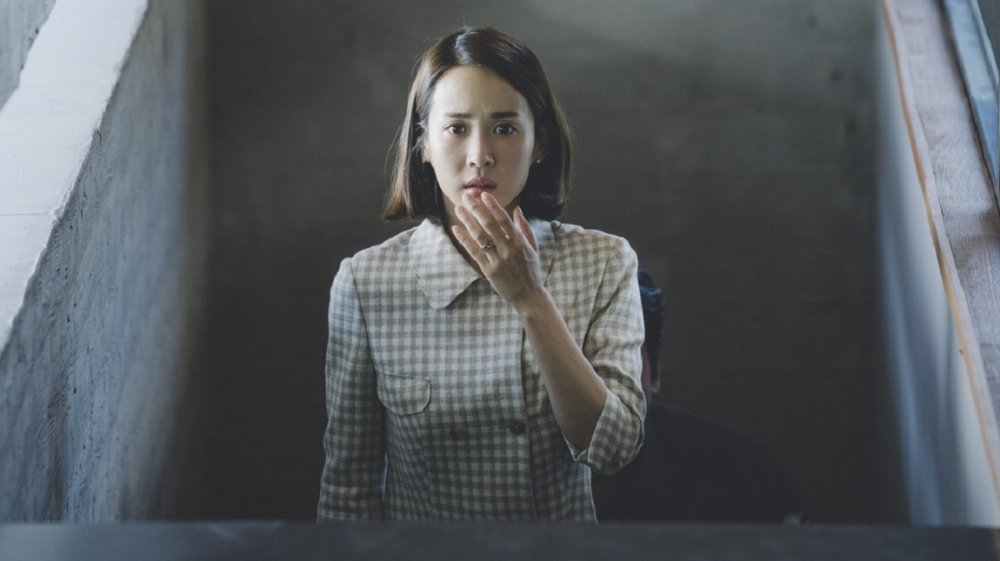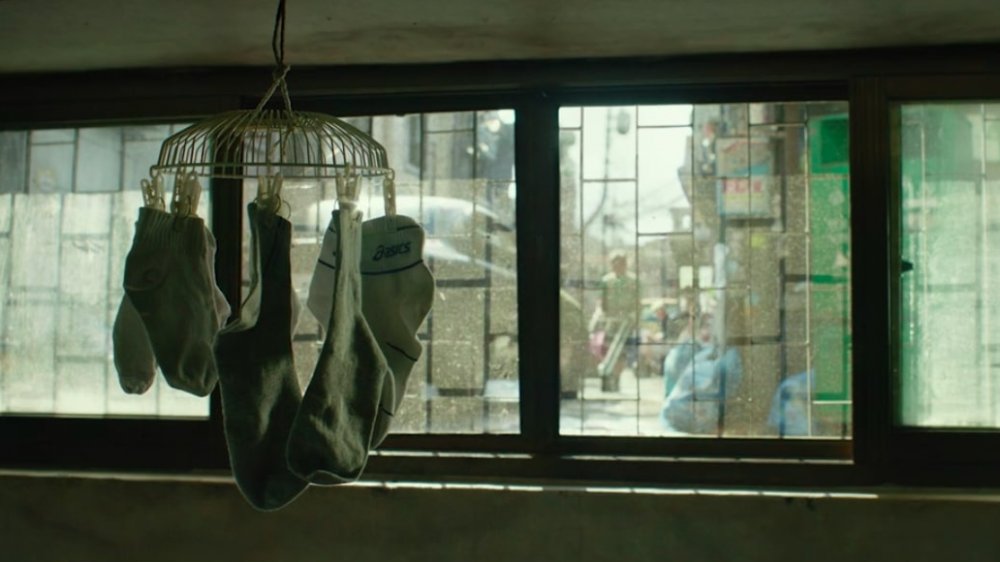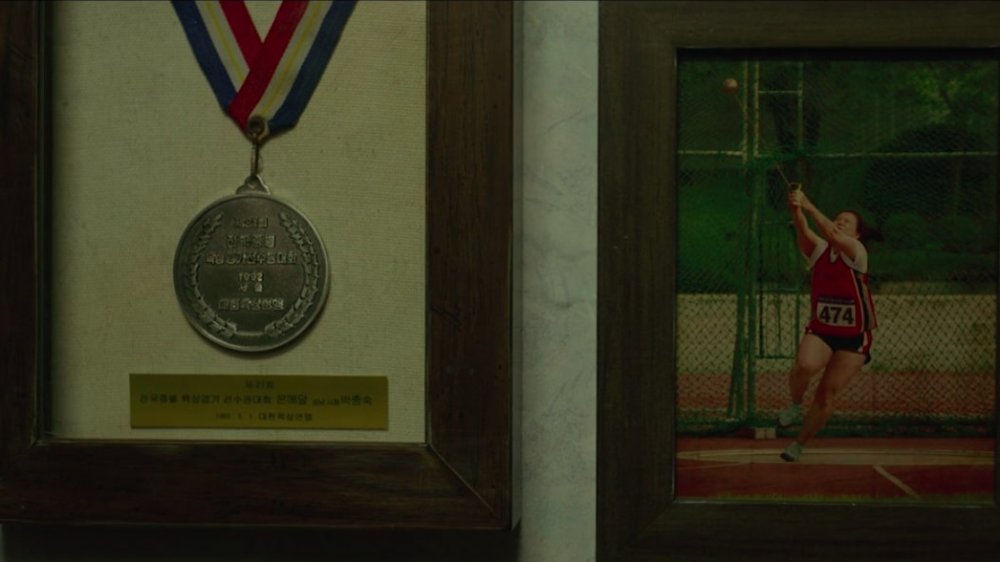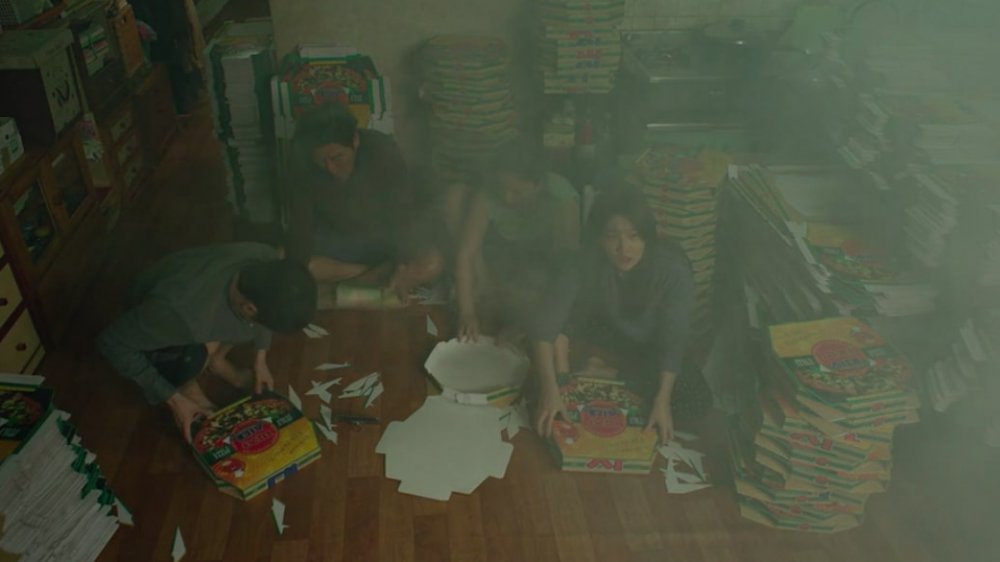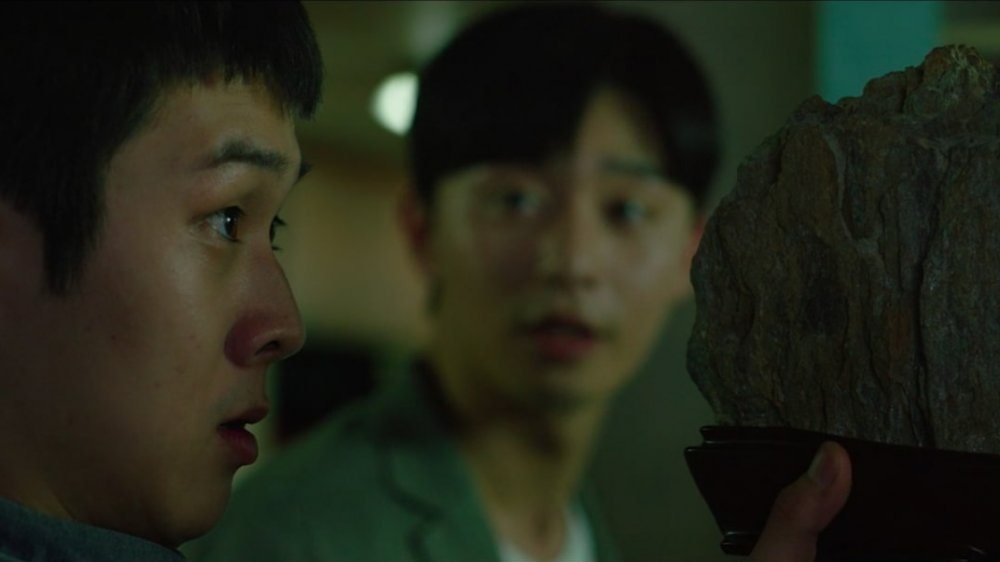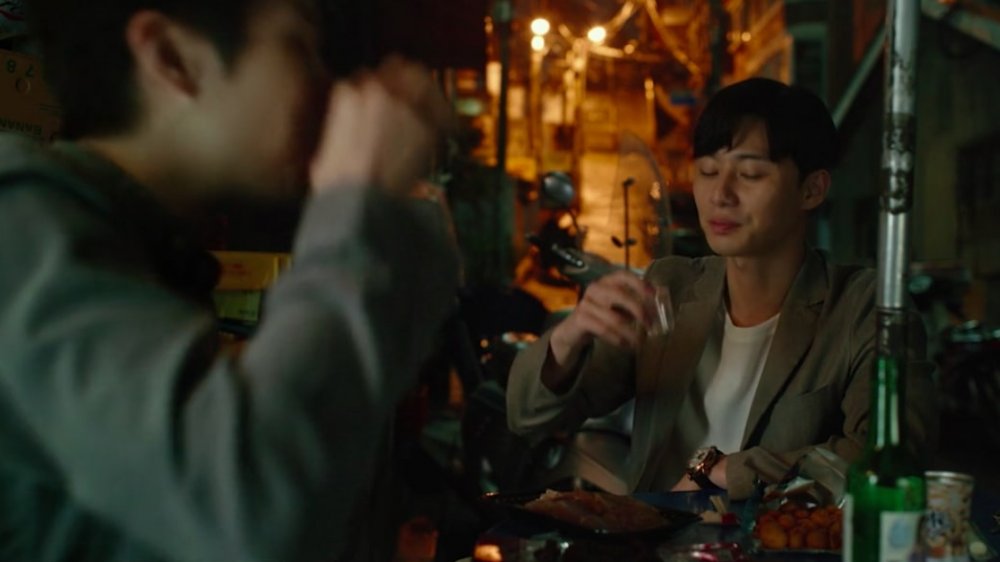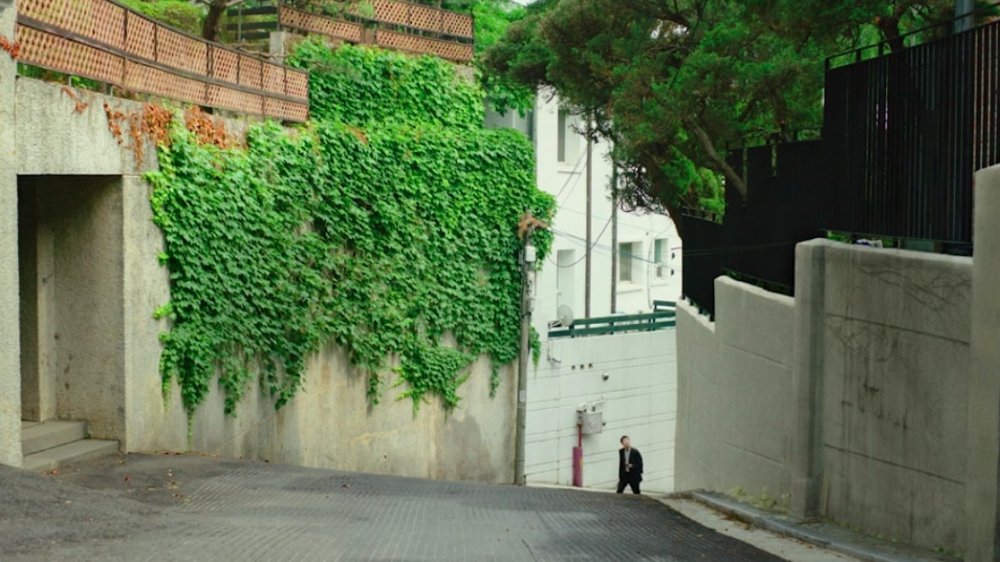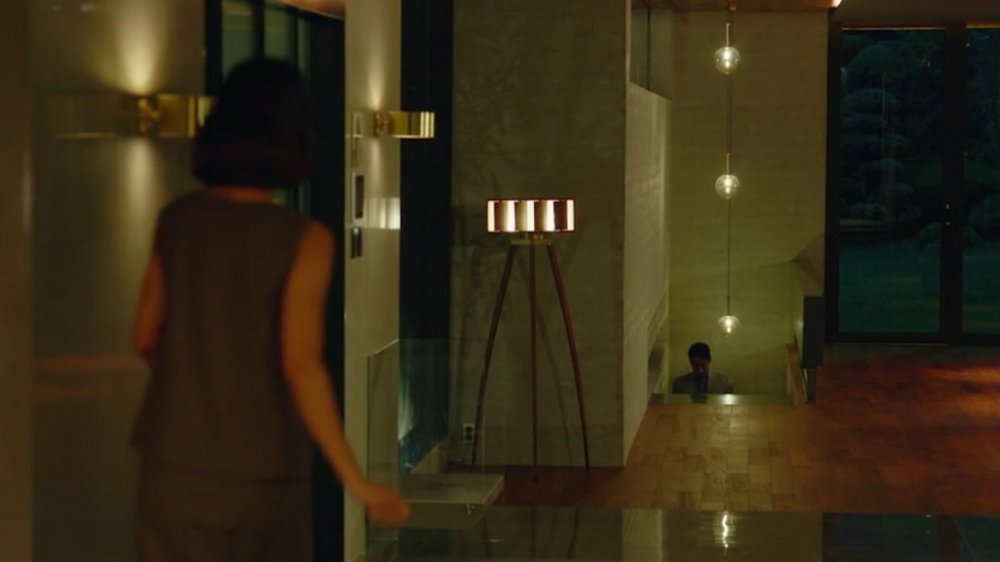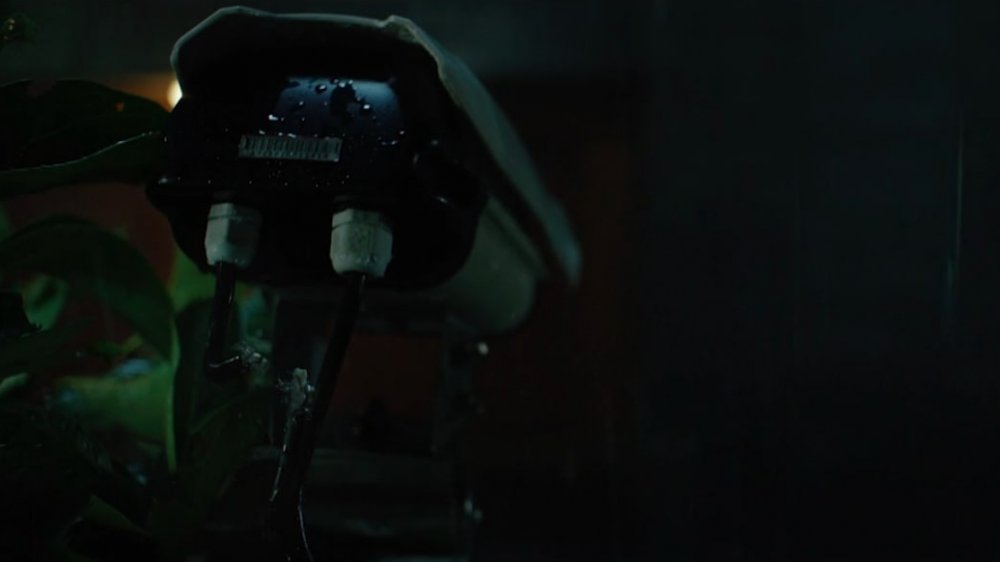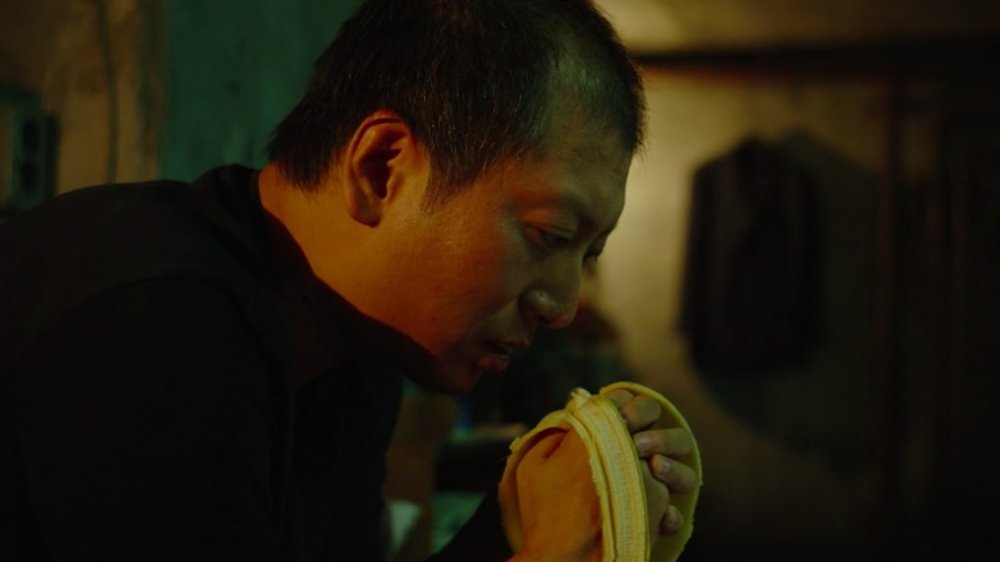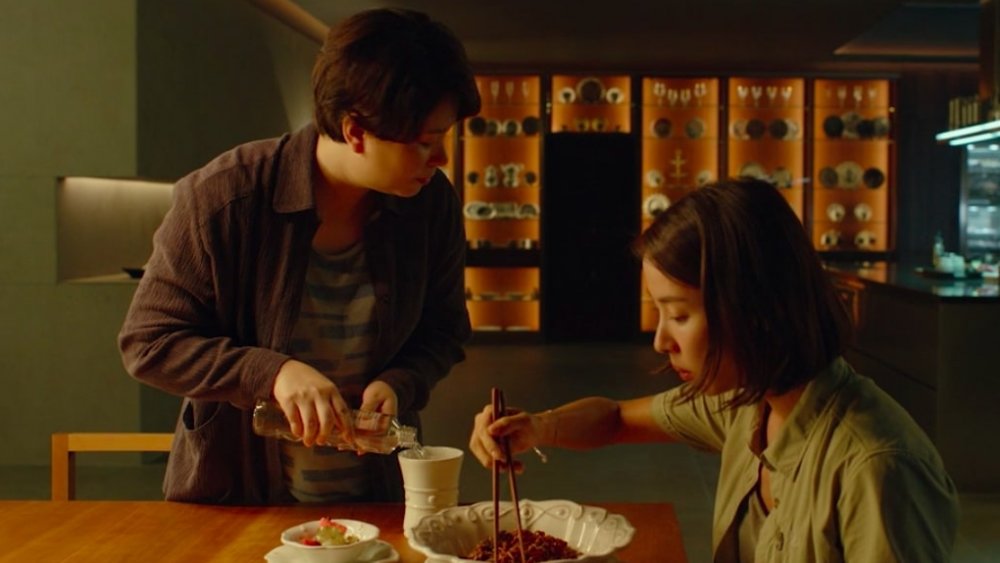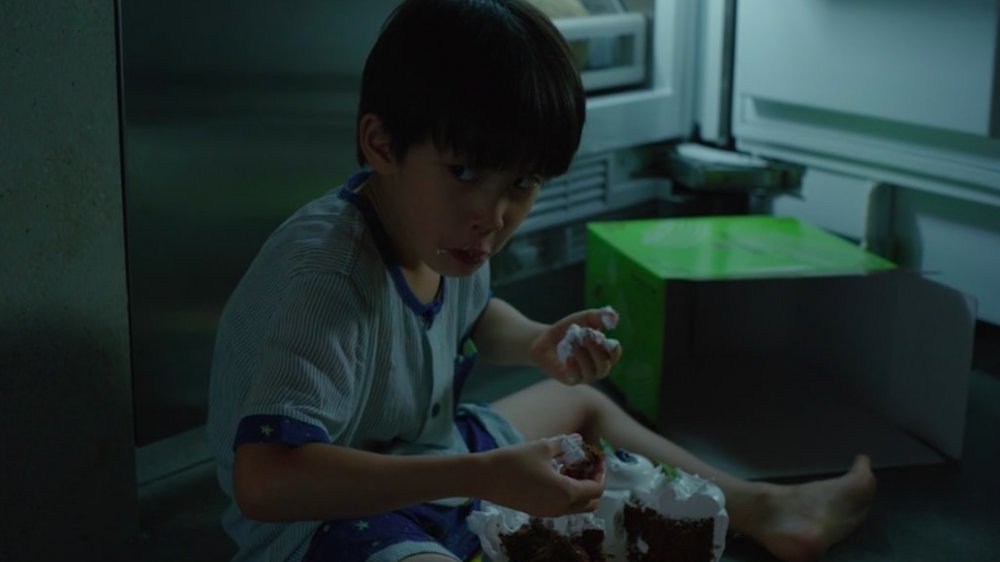Things You Only Notice The Second Time You Watch Parasite
It's hard to remember a film that captured the imagination and attention of moviegoers worldwide like 2019's Parasite, directed and co-written by luminary South Korean filmmaker Bong Joon-ho. Winner of 2020's Academy Award for Best Picture (the first ever non-English language film to do so) — as well as Best Director, Best Original Screenplay, and Best International Feature Film — Parasite's twisted narrative of deception, duplicity, and peaches had audiences across the globe laughing, gasping, and maybe shedding a tear or two at the story of the Kims, a family suffering under the stranglehold of poverty while slowly but surely invading the lives of the obnoxiously rich Park family.
Parasite, alongside being a masterclass in how the sensibilities of arthouse cinema can similarly invade the minds of mainstream audiences, is a movie that practically demands repeat viewings. Granted, initial viewings will convey the surface level themes of this story, but just like the home of the Park family, the deeper down you go, the more truth you'll uncover. So cook up some ram-don, grab your scholar's rock, and remember the lyrics to everyone's favorite song, "Jessica, Only Child, Illinois, Chicago," because we're taking a look at the things you only notice the second time you watch Parasite.
Warning — massive spoilers for the film Parasite.
The opening and closing shots of Parasite are mirrors of each other
Through the twists and turns, ups and downs, and altogether overwhelming puzzle box narrative of Parasite, it certainly takes at least two viewings to dissect the framing and composition present in the collaboration of Bong Joon-ho and cinematographer Hong Kyung-pyo. Bong is especially well known for his extensive storyboarding on his projects, and as a result, there's exquisitely precise thought going into each shot, each level of production design, and even in the specific architecture of each scene.
This is all an elongated means of saying that maybe you didn't notice that the film's opening and closing shots are practically one and the same. At the beginning of the movie, starting from the ceiling of the Kims' home, socks hanging to dry, the camera focuses on the semi-basement view of the apartment, then pans down to Ki-woo (Choi Woo-shik) on the couch, struggling to find a Wi-Fi connection. By the end of the film, when we come back to this same shot, this time with Ki-woo writing to his father in hopes of freeing him from his basement prison, the film has tied itself off in a bow, perhaps signaling that Ki-woo is stuck in a cycle he has no hope of escaping from.
A medal on the wall reveals Chung-sook's past
While much of the action of Parasite is focused on the larger clockwork plot machinations, between the lines, we learn a great deal about the Kim family's hopes, dreams, and what really keeps them going, especially in the lives of the women of the Kim family. Ki-jung's (Park So-dam) passion for graphic design and art comes up pretty early in the narrative when she helps forge a university degree for Ki-woo, but Chung-sook's (Jang Hye-jin) passion comes in the form of a blink-and-you'll-miss-it detail early on.
Hanging on the wall of the Kim home is a medal accompanying a photo of Chung-sook hurling, displaying some evidence of a past life in the world of sports for the Kim matriarch. It's a skill she even demonstrates later on in the film when the Kims are staying in the Parks home while they're away camping. It's further proof of the rich interior lives of the Kims and how their desires and opportunities are being even further crushed by the ugliness of wealth disparity.
Leaving the window open is a big mistake
Early in Parasite, there's a small but noteworthy detail that leads to disastrous consequences later on, and that's Ki-taek's (Song Kang-ho) decision to leave the window open to let fumigation in. On first watch, this choice seems like a simple, effective means of conveying the lengths to which the Kims' poverty causes them to make unsafe decisions at the service of capitalism. There's fumigation happening outside, and they've got a stink bug problem, so why not take advantage of the situation?
This decision, however, ends up costing the Kims more than just a few bug carcasses, as their tendency to leave the window open leads to their downfall when a deadly flood hits their sunken neighborhood, resulting in their entire home being flooded. It's all part of Bong's master plan and a reminder of how every decision we make is just one in a line of dominoes leading to our eventual demise.
A scholar's rock is even more metaphorical than we think
"It's so metaphorical," indeed. For much of Parasite, Ki-woo seems utterly transfixed by the gift he receives from his college friend, Min-hyuk (Park Seo-joon), early on — a large scholar's rock, given to his family to symbolize good fortune for the Kims. Initially skeptical of such a unique gift, Ki-woo's relationship to this strange stone only grows stronger and stronger as the story goes on.
On a repeat viewing, it's difficult not to tie the entire fate of the Kim family to this spiritual stone, representing perhaps more of a curse than a blessing. Yes, the Kims do experience great wealth and fortune through their scheming in the immediate aftermath of receiving the rock. But subsequently, Ki-woo's attachment to the symbolism of the rock leads him to think he must use it to off Moon-gwang (Lee Jung-eun) and Geun-sae (Park Myung-hoon), a decision that leads to his own bloody twist of fate.
Ki-woo and Min-hyuk are more similar than even they can imagine
There's a fine line between taking over someone's job and taking over someone's identity and personality, and Ki-woo starts to broach that line pretty precariously near the midpoint of Parasite. When Min-hyuk provides him the initial opportunity to replace him as the English tutor for the Park family's daughter, Ki-jung (Park So-dam), Min-hyuk lets Ki-woo know that he's been romantically entangled with Ki-jung, and he will resume their relationship once she's in university.
So naturally, as Ki-woo starts to take over for Min-hyuk's tutoring duties, that same romantic entanglement starts to bubble up between the new teacher and his student, and it creates the bedrock for the Kim family's eventual encroachment on the Parks' home. When Ki-woo mentions to his family later on that he'll wait until Ki-jung is in university to move their relationship further, your deja vu might become triggered, as the lives of Ki-woo and Min-hyuk truly start to become one and the same.
The different levels of class are literal in Parasite
Director Bong Joon-ho masterfully straddles the line between arthouse world cinema, and mainstream blockbusters. From previous spectacles like Snowpiercer and Okja to smaller fare like Memories of Murder and Mother, Bong is an absolute master of tackling complex themes in a way that doesn't alienate viewers, and he can speak to a broad demographic of moviegoing audiences from around the world.
Bong similarly excels in finding means of expressing the overt themes of his films in production design and architecture. For example, there's the scene when Ki-woo arrives at the Parks' home, and he's literally walking up an inclined road, ascending from the depths of poverty to the heights of the upper-class, and that path only seems to go up and up. Contrast that with the Kims' home, an apartment that's literally underground. Parasite's themes of climbing the socio-economic ladder are simultaneously clear as day, and it's all hidden right under the surface.
Those sensor lights on the stairs are more mysterious than they appear
The big twist around the halfway point of Parasite is the real gut punch that pulls you in. Moon-gwang, housekeeper for the Parks, has been keeping her debt-ridden husband, Geun-sae, in the lower depths of the Parks home for over four years so he can hide from the loan sharks who are after him. Geun-sae, in turn, has become incredibly grateful to Dong-ik (Lee Sun-kyun), the husband/father of the Park family, and in his delirium, he even sings songs to the patriarchal Park from the depths of the home.
It goes even further. Geun-sae has access to electrical switches that control the stair lights, so that when Dong-ik walks up the steps, Geun-sae is at the ready to turn on each sensor light one by one, and he sometimes even uses the sensor lights to send Morse code messages to the family (not that they can understand any of them). It's a detail that hits you suddenly on rewatch before the film even reveals what's causing these lights to shine for this upper-class family.
Pay attention to the CCTV camera
Parasite is not only about the macro effects of economic injustice, but it also focuses on the ripple effects of our individual actions that reverberate and can often come back to haunt us or help us. For example, it's the decisions of Moon-gwang that inexplicably seal Ki-taek's fate near the conclusion of the film.
After being fired from her job as housekeeper for the Parks, Moon-gwang returns to the home in what's later revealed to be a means of reuniting with her underground husband. To make sure the Parks don't find out she's back, Moon-gwang reveals to Chun-sook that she has cut the wire of the CCTV camera outside the home so there's no security footage of her reappearance. This decision pays off handsomely, however, after Ki-taek has to flee the home after stabbing Dong-ik at the film's bloody climax. Ki-taek is able to sneak back through the garage and back into the basement, with no security camera active to track him, ultimately sealing his underground fate.
A failed Korean food fad ties two characters' fates together
Part of the power of Parasite is how its themes of socio-economic destruction and capitalistic desire are able to cross cultural barriers, yet it's still a film that's highly specific to the world and culture of contemporary South Korea. The best stories typically excel in highlighting specificity that results in achieving universality, and Bong Joon-ho's film is no exception to this. A shining example of this is a small detail that Western audiences might've breezed past initially, but it pokes out like a sore thumb on repeat viewings, inexplicably tying the fates of Ki-taek and Geun-sae together in the story.
In recounting past get-rich-quick schemes, Ki-taek brings up a past attempt at working at a Taiwanese cake shop, a franchising fad that rose and fell in South Korea and what was surely just one in a long line of money-making opportunities. But we learn later on that one of these fad cake shops caused the ultimate downfall for Geun-sae, as his own failed Taiwanese cake shop and the loans that went into it are what's kept him trapped underneath the Parks' home for years. It's one of several early indicators of how, despite their differences, Ki-taek and Geun-sae have both been used and abused by the elite forces of capitalism.
A ridiculous dish exposes the extravagant truth of the Park family
If you're like Chung-sook, you're probably wondering, "What is ram-don?" Well, that's a fantastic question, and we're glad you asked. When the Parks have to cancel their camping trip and head back home unexpectedly, this leads to a darkly hilarious sequence of the Kims trying to throw Moon-gwang and Geun-sae back in the basement, clean up the remnants of their drunken debauchery, and cook up a meal for the Parks consisting of ramen, udon, and Hanu, a Korean premium beef.
But this meal is more than meets the eye, and it tells its own story of wealth disparity. A mix of cheap, over-the-counter ramen and udon noodles, thrown together with some of the most expensive beef in the county, is just the sort of lavish, obnoxiously upper-class dish that a family like the Parks would want to eat. Even in the odd choices of food they enjoy, the Parks can't hide their extravagant lifestyle.
Da-song might be the only one who knows what's going on in Parasite
Oh, Da-song. He's the rambunctious young boy of the Park family who spends his days shooting arrows, camping in the backyard, and drawing absolutely horrifying drawings that are passed off as artistic genius (his self-portrait is a masterpiece, apparently). But he can't even have a birthday party without multiple people getting attacked and stabbed. However, Da-song (Jung Hyeon-jun), even for his youth, may be the only character who could see the truth of the Kims coming from a mile away.
Da-song is able to detect that Ki-taek and Chung-sook have a similar smell (a detail that leads to Ki-taek turning against Dong-ik, too), becoming the only member of the Park family who has any semblance of suspicion that the new housekeeper and driver might be connected somehow. It's also revealed, in a horrifying flashback, that Da-song was the only Park family member to see Geun-sae rising from the basement, though everyone else thinks he just saw a "ghost." If only they'd focused less on what Da-song was drawing and more on what he was saying, instead.
